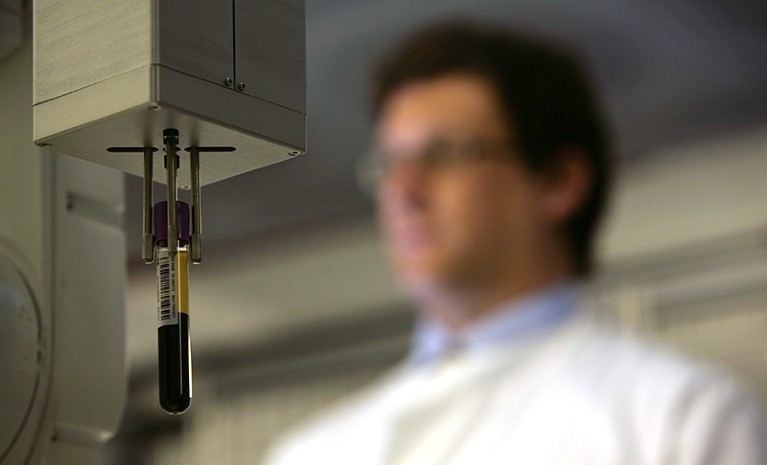EVENTS
Suspected chemical attack in Syria An international team has begun an investigation into a suspected chemical-weapons attack on civilians in Douma (pictured), a besieged town in Syria. It is reported that the attack on 7 April killed dozens of people and affected hundreds more. The Organisation for the Prohibition of Chemical Weapons (OPCW), which enforces the global treaty banning the use of such arms, said on 9 April that it would send inspectors to Syria on a fact-finding mission. Inspectors will try to identify any agents used, thereby confirming whether a chemical attack occurred. Physicians for Human Rights, a humanitarian organization in New York, called for immediate independent collection of environmental and biological samples from Douma. According to Human Rights Watch, there have been 85 chemical-weapons attacks in Syria since 2013, and the OPCW has confirmed the use of mustard gas and the nerve agent sarin in some instances. Since the civil war in Syria began in 2011, an estimated 400,000 people have been killed.

Smoke rises from the besieged town of Douma in Syria following airstrikes on 7 April.Credit: Halil el-Abdullah/Anadolu Agency/Getty
AI boycott ends A group of artificial intelligence (AI) researchers has ended a boycott of collaborations with the Korea Advanced Institute of Science and Technology (KAIST) in Daejeon, South Korea. In a petition letter announced on 4 April, more than 50 researchers stated their concerns over KAIST’s Research Center for the Convergence of National Defense and Artificial Intelligence, which is operated with Hanwha Systems, a defence company in Seoul. The signatories said they would not work with KAIST until they had been assured that the centre “will not develop autonomous weapons lacking meaningful human control”. On 9 April, the group rescinded the boycott after KAIST president Sung-Chul Shin said that the university would not engage in research that is counter to “human dignity including autonomous weapons lacking meaningful human control”.
Scientist sentenced A Chinese scientist was given a ten-year prison sentence by a US court on 4 April for stealing genetically altered seeds. Zhang Weiqiang, a Chinese national who is a US resident, was found guilty in February 2017 of stealing hundreds of seeds from his previous employer, Ventria Bioscience in Junction City, Kansas, and storing them in his home. Zhang was suspected of passing the seeds on to a Chinese crop-research institute. Plants grown from the modified seeds produce therapeutically valuable proteins such as human serum albumin, which is found in blood and needed in large quantities to replenish blood lost in injury or during surgery. Court documents say that Ventria Bioscience spent millions of dollars developing the strains. Zhang was found guilty of conspiracy to steal trade secrets and conspiracy to transport stolen property across state borders, and sentenced to 121 months in prison.
FUNDING
Fellowship launch UK Research and Innovation (UKRI) — Britain’s powerful new research-funding body — announced the creation of a fellowship scheme for early-career scientists on 3 April. The Future Leaders Fellowships, launched in the organization’s first week of operation, will by 2021 support 550 early-career researchers in any discipline, each funded for up to 7 years. UKRI says the fellowships are in addition to existing schemes run by the individual research-funding councils, which have been subsumed under UKRI. The new scheme, which is open to researchers in academia and industry, and around the world, is designed to “develop, retain, attract and sustain research and innovation talent in the UK”.
Opioid research On 4 April, the US National Institutes of Health (NIH) announced a US$1.1-billion research initiative aimed at curbing the opioid epidemic. The budget for the programme, called Helping to End Addiction Long-term (HEAL), is nearly double what the NIH spent on such research in 2016. HEAL’s goals include designing longitudinal studies to follow people with chronic pain, developing neuroimaging technologies to understand how pain manifests in the brain, testing new therapies for addiction and overdoses and partnering with the US military and the Department of Veterans Affairs to develop non-pharmaceutical approaches to pain management. The NIH is also partnering with private drug companies to develop non-addictive painkillers.
Supercomputer cash The US Department of Energy (DOE) announced up to US$1.8 billion in funding for at least two new supercomputers on 9 April. The project request follows an award last June for the Aurora supercomputing system, currently being developed at Argonne National Laboratory in Illinois. One of the systems resulting from the April announcement will be housed at the Oak Ridge National Laboratory in Tennessee, and the second will be at the Lawrence Livermore National Laboratory in Livermore, California. The two supercomputers would come online between 2021 and 2023. The DOE says funds could also support a third system or an upgrade to Aurora, depending on need.
FACILITIES
Whole genomes The UK Biobank, which holds health records and other biological data for some 500,000 people, announced on 5 April that it plans to sequence the complete genomes of 50,000 participants. In 2017, the powerhouse database released limited genetic data — on 800,000 DNA variants that tend to differ between individuals — for all participants. These data have already been mined in dozens of studies looking for DNA variants linked to diseases and biological traits. The whole-genome sequencing, which will be funded by a £30-million (US$42-million) grant from the UK Medical Research Council, will allow for more-sophisticated studies. In January, the UK Biobank (pictured, a blood sample from the biobank) announced plans to release data on the exomes — the small portion of genome that encodes proteins — of all participants by 2019.

A blood sample stored at the UK Biobank.Credit: Christopher Furlong/Getty
Fusion-lab site A laboratory near Rome will host a €500-million (US$618-million) experiment on nuclear fusion called the Divertor Tokamak Test (DTT) facility. Italy’s energy-research agency, ENEA, said on 4 April that it had selected its Frascati laboratory over eight other candidate sites in the country. The DTT will test technologies for extracting heat from fusion plasma. This is a necessary step in the development of fusion-based commercial power stations that the experimental ITER reactor, currently under construction in France, is not designed to take. ENEA plans to begin construction before the end of the year, and to fund the project in part with a €250-million loan it has requested from the European Investment Bank. It also expects a €30-million contribution from China and €60 million from the European EUROfusion consortium.
POLICY
Defence research The number of Japanese research institutions that have procedures to evaluate the ethics of military-related research has doubled in the past year, according to a survey released by the Science Council of Japan on 4 April. Of the 135 Japanese institutes and universities that responded to the survey, 26% said that they now screen research for possible military applications, up from 13% in 2017. The council, which advises the Japanese cabinet, called for a boycott of military-related research in March 2017 after the government boosted funding for ‘dual use’ scientific research with potential military applications. In response to the funding boost, the council asked institutions to introduce evaluation guidelines for such research.
TECHNOLOGY
Moon prize revived XPRIZE of Culver City, California, is continuing its private competition to spur lunar exploration, even though a US$30-million version of the programme sponsored by Google ended on 31 March with no winners. The group said on 5 April that it was looking for new sponsors but would continue the competition without cash for now. Five teams were in the running for the Google Lunar XPRIZE, which required entrants to develop a vehicle capable of landing on the Moon, travelling 500 metres across the surface and broadcasting images and video back to Earth.
BUSINESS
Article-access tool Scholarly-services firm Clarivate Analytics has purchased artificial-intelligence company Kopernio, which has a tool that helps researchers to find and access journal articles with one click. Clarivate, which owns the scholarly search engine Web of Science, announced the deal on 10 April but did not disclose its value. Kopernio offers a browser plug-in that makes it easier for researchers to find and download literature that they already have legitimate access to. The feature will be integrated into Web of Science to help users get around the problem of having to sign in to multiple sites to access articles available as part of an institutional subscription. It also logs academics’ access credentials so that they can access pay-walled papers off campus.
TREND WATCH
A survey of 1,839 current and former UK students has found that 41% experienced sexual misconduct — such as inappropriate comments, unwanted touching or assault — by staff at university. About 12% of current students said a staff member had touched them in a way that made them uncomfortable. Women were more likely than men, and postgraduates more likely than undergraduates, to report such harassment. The National Union of Students conducted the survey.

Source: NUS/1752 GROUP



